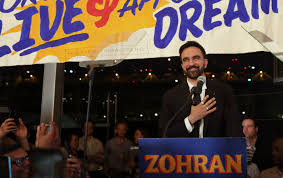As Zohran Mamdani rises, anti-Muslim attacks roll in from the Right

Zohran Mamdani, a New York State Assemblymember representing Queens’ 36th District, is becoming a nationally recognized progressive voice. His bold advocacy for tenants’ rights, healthcare for all, and support for Palestinian human rights has won him admiration from the left. But this visibility has come at a price.
As Mamdani’s influence grows, he is facing coordinated attacks from conservative commentators. These critics are using Islamophobic rhetoric to question his intentions, loyalty, and right to speak on foreign policy issues.
From Community Organizer to Public Office
Born in Uganda and raised in New York City, Mamdani brings a unique perspective to state politics. He is the son of renowned filmmaker Mira Nair and academic Mahmood Mamdani. Before entering politics, he worked as a housing counselor and organizer.
His 2020 election to the Assembly marked a generational shift. He ran as part of the Democratic Socialists of America (DSA) slate, pledging to fight for housing justice, decarceration, and climate action. He remains one of only a few Muslim lawmakers in New York State.
Targeted by Right-Wing Rhetoric
Right-wing media outlets have increasingly singled out Mamdani. Some label him “radical” and falsely accuse him of pushing “Islamist agendas.” Many of these attacks have focused on his identity as a Muslim and his criticism of U.S. foreign policy, particularly toward Israel.
These attacks rely heavily on fear-based narratives. Rather than debating Mamdani’s policies, critics attempt to discredit him by framing his faith as a threat. This pattern reflects a broader trend of Islamophobic targeting faced by Muslim politicians across the country.
A Familiar Pattern of Islamophobia
Mamdani is not the first Muslim politician to face this treatment. Representatives Ilhan Omar and Rashida Tlaib have also been vilified in similar ways. Whenever Muslim lawmakers raise concerns about global human rights or U.S. foreign policy, their patriotism is questioned.
This is not just about policy disagreement — it’s about silencing certain communities. By focusing on their religion, critics deflect attention from the real issues being raised.
Standing Strong in His District
Despite the noise, Mamdani remains popular in his home district. Astoria is one of the most diverse neighborhoods in the U.S., with many immigrants and working-class residents. His progressive platform aligns closely with their needs and values.
Constituents have publicly supported him, both in local forums and online. Progressive organizations and fellow lawmakers have also defended him, denouncing the anti-Muslim rhetoric aimed at discrediting his work.
Responding with Clarity and Resolve
Mamdani has addressed the attacks head-on. In a recent statement, he said, “Criticism of my policies is welcome, but attacking my faith is unacceptable. My identity is not a threat to democracy.”
He continues to focus on legislation that matters to his community. From housing justice to ceasefire resolutions, Mamdani remains committed to a politics rooted in equity and justice.
Islamophobia in American Politics
The backlash against Mamdani is not an isolated case. It reflects a systemic problem within American politics. Islamophobia is often used as a political weapon to marginalize Muslims and delegitimize their voices.
Whether through surveillance, media narratives, or online hate, Muslim leaders face added barriers that their peers often do not. Their presence challenges dominant norms and forces uncomfortable conversations. This makes them frequent targets of fear-based political attacks.
The Bigger Picture: Democracy at a Crossroads
What’s happening to Mamdani is bigger than one lawmaker. It raises questions about who gets to participate in American democracy and on what terms. If Muslim politicians are continuously portrayed as outsiders, even when born and raised in the U.S., it signals a deeper exclusion.
Mamdani’s continued presence in politics pushes back against that exclusion. It sends a message: Muslims — and other marginalized communities — belong in every part of the political process.
Conclusion: Leadership Without Compromise
Zohran Mamdani’s rise shows that bold leadership can inspire both admiration and backlash. While right-wing figures attempt to discredit him using Islamophobia, his unwavering commitment to justice resonates with many.
He is not backing down. And in doing so, he’s carving a path for others who believe in justice, equality, and the right to speak without fear — no matter their faith.






